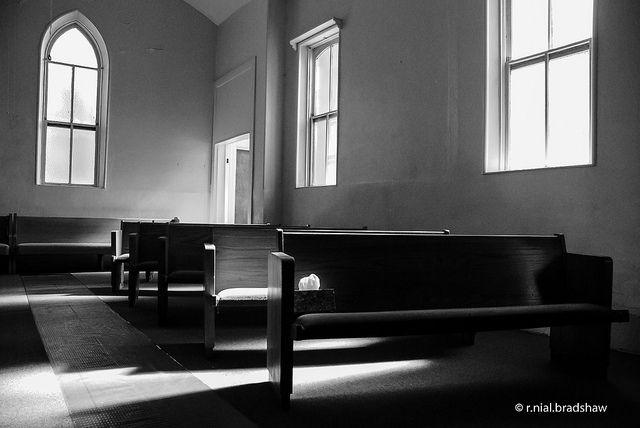Heresy- What Does This Mean Part 1
By Sarah Arnold
I was looking for a picture to use with this post and stumbled across this one—and it seems to be a perfect description of heresy. The Church isn’t made for “progress,” so it seems only logical to define the opposite of sound doctrine—heresy—as progressive. The church is made for sound doctrine, and sound doctrine alone, teachings that are unchanging in a world of fluidity and cultural sensitivity. We wouldn’t want to offend anyone, and let’s face it–sound doctrine offends our sin nature.
We don’t seem to hear the word heresy much anymore because it’s considered a “divisive” word. Often those of us in Confessional Lutheran circles who do use the term have it pejoratively thrown back at us, saying we shouldn’t care about sound doctrine. In doing so, we are intransigent and contumacious, bucking the authority of political correctness just to be “right”. Just go with the flow, man!
Romans 12:2 says,
“Do not be conformed to this world, but be transformed by the renewal of your mind, that by testing you may discern what is the will of God, what is good and acceptable and perfect.”
Rather than adopting the “progress” of the world, we are to stand solid and firm in our teachings. That is why understanding heresy is so important, and perhaps something a bit near and dear to my theological heart.
Okay, I’ll admit, I’m a little bit of a heresy buff. I’ve researched and documented over 200 heresies in the past few years, and have become known in my circle of influence as a subject matter “expert” on this topic (although I’d say I still have more learning to do). I do believe it is of vital importance to be able to identify and refute false teaching. Interestingly, I think I spend about as much time doing that in my vocation (a political consultant) as I do amongst fellow Christians. To that end, this series of posts will explore a variety of topics, including:
- What is a heresy?
- What kind of heresies are there?
- The church councils and condemning heresies
- Heresies mentioned in the Book of Concord
- Timeline of heresies
- Major vs. minor heresies (or, doctrines of salvation vs. ‘adiaophora’)
- Why calling heresy out matters
- Analysis of common heresies (ancient and modern) and how to respond
To understand what we are talking about, the debater in me necessitates that I clearly define out terms.
The word “heresy” comes to us from the Greek hairesis (αἵρεσις), meaning “a self-chosen opinion, a religious or philosophical sect, discord or contention.” (Strong’s Concordance)
As defined in the Christian Cyclopedia, heresy is:
“the term… used in the NT in a condemnatory sense; heretics are contentious (1 Co 11:16–19), deny the Lord, are pernicious, covetous, deceivers for gain, false teachers (2 Ptr 2:1–3), are subverted, sinners, and self-condemned (Tts 3:10–11; cf. schism in 1 Co 1:10; 11:18; 12:25).”
The New Advent Online Catholic Encyclopedia adds:
“St. Thomas (II-II:11:1) defines heresy: “a species of infidelity in men who, having professed the faith of Christ, corrupt its dogmas”. “The right Christian faith consists in giving one’s voluntary assent to Christ in all that truly belongs to His teaching. There are, therefore, two ways of deviating from Christianity: the one by refusing to believe in Christ Himself, which is the way of infidelity, common to Pagans and Jews; the other by restricting belief to certain points of Christ’s doctrine selected and fashioned at pleasure, which is the way of heretics. The subject-matter of both faith and heresy is, therefore, the deposit of the faith, that is, the sum total of truths revealed in Scripture and Tradition as proposed to our belief by the Church. The believer accepts the whole deposit as proposed by the Church; the heretic accepts only such parts of it as commend themselves to his own approval.”
The Christian Cyclopedia defines doctrine as,
“Jesus commanded His disciples to teach all nations to observe all that He commanded them (Mt 28:20). What the disciples taught was Christian doctrine. When men teach what Jesus commands, they teach the truth; when they teach anything contrary to His commands, they teach error or heresy. The teachers of the church soon found it necessary to defend the truth of their faith against error in their midst and against attacks from Jews and pagans. This made it necessary for them to formulate their doctrine so that it would be clear to others. This led to the fixation of dogma. Those who taught error also formulated their doctrine; as the centuries passed, error increased in scope and variety.”
Now that we have a clear definition of what heresy and doctrine are, we can further dissect heresies in the upcoming posts. Although many of these heresies are “old,” they still infect the Church today. As the Bible tells us in Ecclesiastes 1:9,
“What has been is what will be, and what has been done is what will be done, and there is nothing new under the sun.”
Heresies are not excluded from this, as many false doctrines taught today are merely recycled heresies.
About the Author: Sarah Arnold is a Colorado native and long-time political consultant. She lives in Denver with her husband Matt, an Army Reserve Major, and two sons, Erik (toddler) and Max (newborn). Sarah is a cradle Lutheran and member of Hope Lutheran Church in Aurora, CO. When not mommy-ing or politicking, Sarah enjoys theology, the Colorado outdoors, reading, writing, music, and dancing. Sarah blogs about theology(especially heresies) and politics. Like any good millennial, Sarah lives on Instagram, sharing her sons’ cuteness with the world.




One Comment
Russell
Let’s just say that our church has a Bible study group, and the members call themselves The Heretics. Needless to say we don’t exact study scripture.